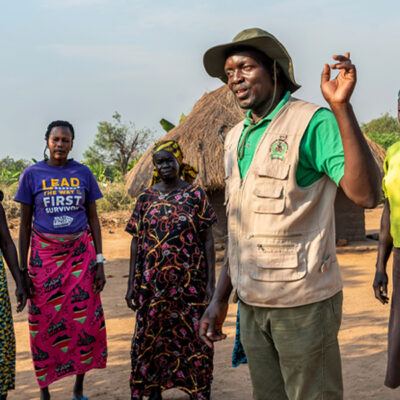For more than two years, American Jewish World Service has been working to improve the way the United States delivers life-saving food assistance to millions of hungry people worldwide. Thanks in part to the efforts of committed AJWS activists, AJWS and other allies were able to push forward incremental improvements to food aid programs in the Senate Farm Bill. A vote in the House of Representatives for even stronger reforms fell short by just nine votes.
The United States’ well-intentioned, but ill-advised food aid response in the wake of the 2010 earthquake in Haiti demonstrated that the U.S. food aid system was long over-due for a makeover. Typhoon Haiyan and the ongoing massive humanitarian crisis in the Philippines, has only added urgency to that fight.
Through the generous support of AJWS donors, AJWS is supporting community-driven efforts to provide food, water and medical treatment to people displaced by the typhoon.
To address food shortages, the U.S. government has also adopted a partnership model, providing $10 million in support to the United Nations’ World Food Program (WFP). This assistance is being provided in three ways: delivery of nutrition-dense, ready-to-eat biscuits airlifted from Miami; funding to purchase available rice in local markets to distribute along with other goods to families; and shipping a month’s supply of U.S.-grown rice from a warehouse in Colombo, Sri Lanka. The biscuits and locally-sourced rice are being distributed right now, the donated rice—slowed by travel time—will arrive the first week of December.
The United States’ multi-prong approach points to the complex nature of these types of humanitarian disasters and the need for a range of tools to get help to people in-need after disasters. Unfortunately under current law, our food aid response options are limited. The only reason we’re seeing this nimbleness in the Philippines is because it’s early in the federal government’s fiscal year and it has yet to max out funding for alternatives to shipping commodities from the U.S. abroad.
So, what can we be doing to make sure the U.S. has the flexibility to respond with food aid most effectively in times of crisis? AJWS is still working toward long-term change through ongoing Farm Bill negotiations, but you can make a difference right now. Consider signing this grassroots petition to lift food aid delivery restrictions to those affected by Typhoon Haiyan. This will ensure that aid will continue to flow to those who need it most. The U.S. can do better. Let’s start today!
Dahlia Rockowitz is a policy associate at AJWS.


